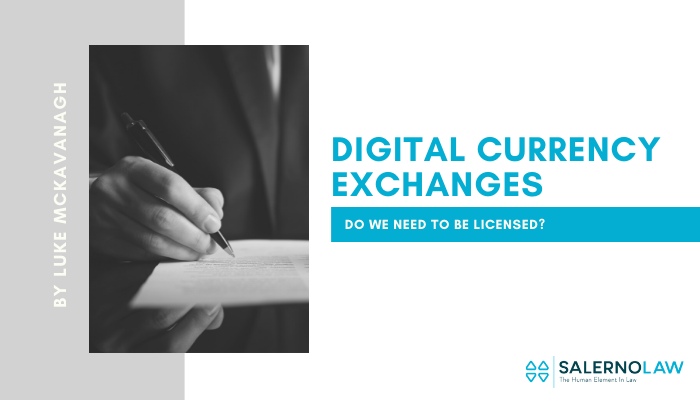Digital Currency Exchanges – Do we need to be Licenced?
In 2018, we first wrote about the introduction of the newly amended Anti-Money Laundering and Counter Terrorism Laws that were expanded to regulate Digital Currency Exchanges (DCE). The amendment required all DCEs to register with the Australian Transaction Reports and Analysis Centre (AUSTRAC).
As cryptocurrencies and digital assets (Digital Assets) become more mainstream, and governments and regulators evolve, so does the regulatory environment.
There is a common misconception that all Digital Assets are viewed or categorised the same way, and are therefore, unregulated. However, this is not the case.
In Australia, the Australian Securities and Investment Commission (ASIC) regulates financial products and markets. ASIC has provided updated guidance for DCEs stating that “if a platform deals in crypto-assets that are financial products, then the platform is operating a market and a range of Australian laws apply, including the requirement to hold an Australian market licence”.[1]
The key consideration in determining whether a DCE requires an Australian market licence, is whether any of the Digital Assets traded on their exchange is captured within the definition of a financial product. A Digital Asset is likely to be categorised as a financial product if, by its substance or operation, it is a:
- managed investment scheme;
- security;
- derivative; or
- non-cash payment facility.
Where a DCE enables consumers to buy/be issued or sell Digital Assets categorised as a financial product, the DCE will be required to hold an Australian market licence with appropriate authorisations from ASIC. Facilitating trades of financial products without the required licences may amount to a significant breach of the law.
DCEs that facilitate the trading of Digital Assets that are not characterised as financial products are currently not subject to regulatory oversight by ASIC.
At present, most DCEs facilitate the trade of a range of Digital Assets without considering the specific nature of each asset. It is important to note that Digital Assets have different functions and will be classified differently. For example, Bitcoin as a stored value will be classified differently to Ethereum as a decentralised blockchain network that facilitates the running of decentralised applications (dApps).
It is likely that many DCEs have not considered the nature of the Digital Assets listed on their platform, nor have undertaken a review of whether the any listed assets constitute financial products.
If you are concerned about any of the Digital Assets listed on your exchange, thinking of creating a DCE, or would like to speak to one of our Cryptocurrency Experts, the team at Salerno Law are here to help.
[1] INFO 225, Australian Securities and Investment Commission, https://asic.gov.au/regulatory-resources/digital-transformation/initial-coin-offerings-and-crypto-assets/
By Krish Gosai
Krish is a Corporate and Fintech Lawyer in our Financial Technology and Cryptocurrency team. With significant experience in Commercial, Fintech and Financial Services Law, in Australia and overseas, Krish brings a highly commercial and practical approach to his clients.




Leave A Comment